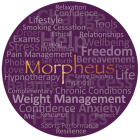Anxiety
word definitions taken from Wikipedia
If you go and see your GP – they will tell you that Anxiety is the body’s natural primal response to ‘fight or flight’.
Anxiety (also called angst or worry) is a psychological and physiological state characterized by somatic, emotional, cognitive, and behavioural components. The root meaning of the word anxiety is ‘to vex or trouble’; in either presence or absence of psychological stress, anxiety can create feelings of fear, worry, uneasiness, and dread. Anxiety is considered to be a normal reaction to a stressor. It may help someone to deal with a difficult situation by prompting them to cope with it. When anxiety becomes excessive, it may fall under the classification of an anxiety disorder.
Anxiety is a generalized mood condition that can often occur without an identifiable triggering stimulus. As such, it is distinguished from fear, which is an emotional response to a perceived threat. Additionally, fear is related to the specific behaviours of escape and avoidance, whereas anxiety is related to situations perceived as uncontrollable or unavoidable. Another view defines anxiety as “a future-oriented mood state in which one is ready or prepared to attempt to cope with upcoming negative events”, suggesting that it is a distinction between future vs. present dangers which divides anxiety and fear.
In a 2011 review of the literature, fear and anxiety were said to be differentiated in four domains: duration of emotional experience, temporal focus, specificity of threat, and motivated direction; fear was defined as short-lived, present-focused, geared towards a specific threat, and facilitating escape from threat while anxiety was defined as long-acting, future-focused, broadly focused towards a diffuse threat, and promoting caution while approaching a potential threat.
Physical effects of anxiety may include heart palpitations, muscle weakness and tension, fatigue, nausea, chest pain, shortness of breath, stomach aches, or headaches. The body prepares to deal with a threat: blood pressure and heart rate are increased, sweating is increased, blood flow to the major muscle groups is increased, and immune and digestive system functions are inhibited (the fight or flight response). External signs of anxiety may include pale skin, sweating, trembling, and pupillary dilation. Someone who has anxiety might also experience it as a sense of dread or panic. Although panic attacks are not experienced by every person who has anxiety, they are a common symptom. Panic attacks usually come without warning, and although the fear is generally irrational, the perception of danger is very real. A person experiencing a panic attack will often feel as if he or she is about to die or pass out.
Emotional effects may include “feelings of apprehension or dread, trouble concentrating, feeling tense or jumpy, anticipating the worst, irritability, restlessness, watching (and waiting) for signs (and occurrences) of danger, and, feeling like your mind’s gone blank” as well as “nightmares/bad dreams, obsessions about sensations, deja vu, a trapped in your mind feeling, and feeling like everything is scary.”
Cognitive effects of anxiety may include thoughts about suspected dangers, such as fear of dying. “You may…fear that the chest pains [a physical symptom of anxiety] are a deadly heart attack or that the shooting pains in your head [another physical symptom of anxiety] are the result of a tumour or aneurysm. You feel an intense fear when you think of dying, or you may think of it more often than normal, or can’t get it out of your mind.”
Behavioural effects may include withdrawal from situations where unpleasant effects of anxiety have been experienced in the past. It can also be affected in ways which include changes in sleeping patterns, nail biting and increased motor tension, such as foot tapping.
How can Morpheus Associates help?
Hypnotherapy is used successfully to help people deal with a wide range of conditions. It is widely recognised now in its success with helping people with relaxation, and techniques are used to help people manage stress and anxiety associated with many other conditions. The client normally awakes feeling re energised and revitalised, with new hope and a positive frame of mind.
We offer an Initial 15-20 minute consultation which is free. At the end of this consultation you will be asked if you wish to proceed. At which point we will explain the fees per session, relevant to the treatment recommended and how many sessions are suggested as being required. We are located at Clarice House in Ipswich, The Heritage Centre Bury St Edmunds, Clarice House Colchester and Harley Street London. If a course of treatment is recommended, subsequent sessions are offered at a discounted price. Payments are accepted by cash or cheque with guarantee card only.
Please feel free to read our recent testimonials (link) from clients who have had this condition treated by Morpheus Associates
If you are comfortable with the idea, please call us to book an Initial 15-20 minute consultation, at which time you can decide if you feel the treatment offered would possibly help. Call Debbie Crooks on 07840-694743

